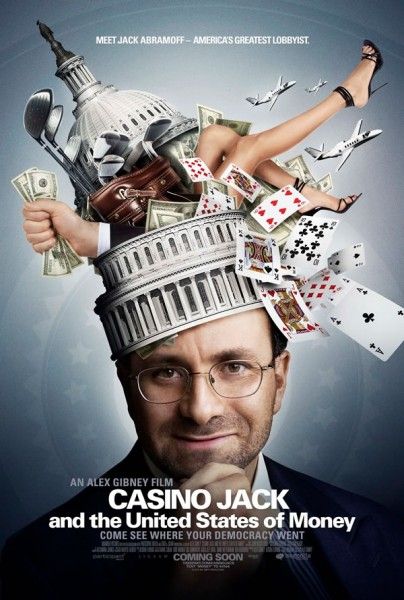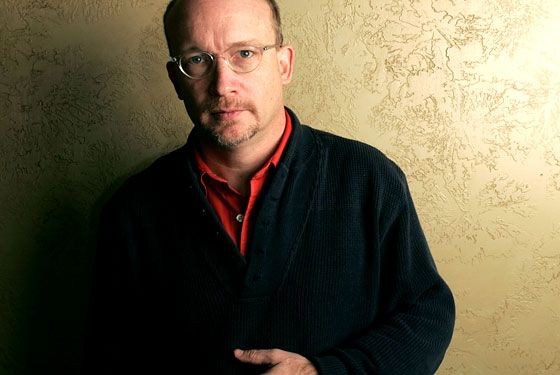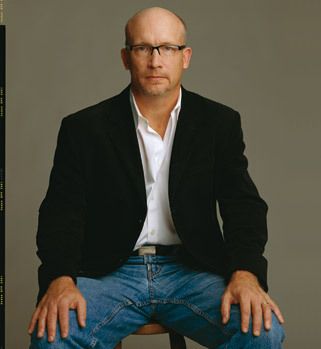Alex Gibney has made some of the most entertaining and provocative non-fiction films of our times. He turned the story of a massive corporate disaster into a riveting drama of greed, arrogance and betrayal in the acclaimed Enron: The Smartest Guys in the Room. Next he unraveled the mystery of a young Afghani taxi driver’s disappearance into a gripping, eye-opening thriller in the Academy Award winning Taxi To The Dark Side.
Now, in Casino Jack and The United States of Money, Gibney turns his camera on a profoundly American story about high ideals, irresistible temptations, brazen ambition and outlandish behavior as he probes the secret history of the man many have called “the king of corruption” – super-lobbyist Jack Abramoff. More after the jump:
We sat down recently with Alex to talk about his new movie. He told us how he set about uncovering a true story that played out like an outrageous dark comedy, how the combination of money, power and a shameless lack of restraint snowballed into a calamitous and criminal downfall, and how influence peddling in Washington has become a high-stakes political game that’s being played at the expense of the American public.
Alex updated us on his upcoming projects, including Untitled Eliot Spitzer Project, Untitled Lance Armstrong Documentary, and Magic Bus, which are all currently in post-production. He also told us about his newest project, Catching Hell, which he’s directing for ESPN Films’ “30 for 30” documentary series in celebration of their 30th anniversary.
--
Q: What drew you to this project and why was this an important film to make?
AG: The story attracted me. Only once have I taken on a subject because of the subject, which was Taxi to the Dark Side. Somebody said to me “Would you do a film about torture?” And even there, I looked for the story. This one, the story jumped out at me -- this wild character, Jack Abramoff, who was just all over the map, who seemed to be so close to the most powerful people in the country, who was involved in some way, shape or form with a Mob hit in Miami, with Chinese sweatshops in the Mariana Islands, with Indian Casinos, with gun deals on the West Bank. I thought, “Wow! What a character!” So that’s what led me first to the story.
Q: This movie tells a pretty crazy story. What was the most surprising thing you learned?
AG: That he was not a bad apple. He was spectacular evidence of a rotten barrel. That what Jack does, or did do, in some way was outrageous and way off the charts. He really pushed…he shredded the envelope as somebody liked to say. But, in many ways, there are a lot of things that he did that are perfectly mainstream in the lobbying community. The other thing I learned that I didn’t expect was I always thought it was the lobbyists who were the problem, those bad lobbyists. I now believe something different, which is that lobbyists are important. They’re essential to our democracy. You need representatives to talk to the representatives. Every interest group needs to be efficient. But, when you put lobbyists together with this desperate need that Congress people and Senators have for money in order to get elected, then you’ve got a serious problem. It’s like nuclear fission. It’s putting those two rods of uranium together and you have a spectacular explosion and sadly the mushroom cloud sits over our democracy.
Q: How did you gain access to the key players and get them to open up and reveal so much?
AG: It’s always hard to get to people. This film took a long time in part because of that. I tried very hard to get to Jack. But, in waiting to get to Jack, we got Bob Ney. I’d written him many times in prison. When he got out, one of my producers, Zena Baraket, met him through another means and pitched it to him again and finally he agreed. That was just tremendous for us for all sorts of reasons because Bob was like the sous-chef in the kitchen of the world’s biggest Chinese restaurant. When you finally see how the sausage is made, it’s terrifying. You don’t really want to know, but he tells you. Also, his relationship with Neil (Volz) is really the beating emotional heart of the story, because then you see how corruption tears at human relationships, in addition to being a systemic political problem. That’s really something you feel at the end when you see those shots of Bob showing up at Neil’s wedding and you realize that this very close personal relationship is now destroyed as a result of this corruption. You understand in a more emotional way the cost.
Q: Even though Jack Abramoff is in jail now, the lobbying and campaign finance systems remain largely intact. What do you think is the solution to the influence peddling in Washington which is stifling genuine political debate?
AG: We have to find a way to take the money out. There are a number of small steps on the way to that. There’s a pretty good bill in Congress now that’s proposed by (Senator) Dick Durbin which would dramatically lower the maximum campaign contribution and people could voluntarily opt into that which would make them eligible for matching funds. That’s a small step, but a good and important one. Another interim step are these wonderful websites that people should religiously view which show very clearly the amount of money that Congressmen and Senators are getting from certain sectors and certain people so you can really track and see how they’re being influenced. So, those are two pretty good first steps. But, the big goal should be to find a way to demand that we radically take the money out of the campaign system. There’s no way in the world that the framers (of the Constitution) imagined that our representatives would be spending 2 to 3 days out of every work week dialing for dollars.
Q: What do you look for in a project?
AG: Anything that will pay the college tuition of my children. That’s the key motivating factor. Honestly, it is the story, because if you don’t have a good story, at least in what I do, [then it’s not worth doing]. It’s one thing if you’re doing Frontline or something like that – “This is a report on this. This is a report on that.” But it’s the story always. Sometimes these stories come to me and sometimes I seek them out. This was one I saw. I mean, a lot of other people saw it too, but I thought “That would make a great movie.” The Eliot Spitzer film [Untitled Eliot Spitzer Project], somebody brought that to me and said “Would you do that?” I said, “Yeah, that’s a great story.”
Q: You were just in NY at the Tribeca Film Festival with that and it got great reviews. When will the movie be done and who might be getting it? Also, are there any changes since it’s a work in progress?
AG: I don’t know who’s going to pick it up. A lot of distributors are interested so we’ll just see. That will play itself out over the next few days. I think we can complete it pretty quickly. We’re pretty close to being done. One of the reasons I wanted to show it as a work in progress was to get the reactions of an audience – the same thing as I did with Casino Jack at Sundance. After Sundance, we took 8 minutes out of the movie, thinned the narration, and created some pauses. It’s important to see how these things work. If they’re intended for the big screen, then they should work there. I think Spitzer is pretty close. We’ll make it shorter and there are some things we need to make a little bit clearer. Those are the key changes.
Q: What is Magic Bus about?
AG: Ken Kesey. When they took their famous LSD-fueled trip across the country in 1964, they shot about 40 hours of 16mm film. We got the rights to that film and we restored it and now we’re making that as a movie. It’s a total immersion experience.
Q: How’s the Untitled Lance Armstrong Documentary coming along?
AG: Great. I just had a meeting about it today. We’re very close to having that finished. It’s a very exciting project. Sony gave me the resources to really film that sport in an exciting way so that there are parts of it that feel like an action film. It’s great.
Q: What was it like being at Sundance and what is so special about the festival to you?
AG: What’s great about the Sundance Film Festival is the festival takes over that town as it’s intended to do. But, it’s very focused on a lot of other filmmakers and distributors so it almost feels like, while they’re a lot of so-called civilians there, it’s an opportunity that you have to see, to show your stuff to the other folks, your peers really, and to get that reaction. That’s very important. There’s a very collegial sensibility there which I like a lot -- collegial and focused.
Q: How do you find time to work on so many films at once?
AG: I don’t know. I ought to have my head examined. I have no clue. One thing, quite seriously, the only way it’s possible is by surrounding myself with a lot of very intelligent and talented people. The stuff about film being a collaborative medium is no joke. If I didn’t have great cinematographers, great editors, great producers, I’d never make it.
Q: Do you have any other upcoming projects?
AG: I don’t think so. I think that’s a pretty good list. Oh, I am doing this one for ESPN. I’m doing one of their 30 for 30 films. ESPN, for their 30th anniversary, they’re getting 30 filmmakers to do 30 films about sports and they can be about anything. So, I’m doing one of those. Barry Levinson did one and Spike Lee did one. My good friend Steve James, the guy who did Hoop Dreams, did one.
Q: What’s your 30 for 30 project going to be about?
AG: It’s called Catching Hell. (Laughs) I know, sooner or later I’ve got to get light. I’ve got to do some fun projects with a lot of laughs. It’s about two people, Bill Buckner and a poor kid named Steve Bartman, who found themselves at a particular moment in time where they tried to catch a ball and they didn’t and were vilified for it – where the passion of the fan turns ugly.
Q: What would you like an audience to take from Casino Jack?
AG: I’d like them to be very angry and I’d like them to do something. And, the ‘do something’ is rattle the cages of Congress so we get the money out. Because I really feel on this one, very rarely – not Enron, not Taxi really – but on this one, there’s one simple solution. It may not be easy to effect, but if we can’t figure out how to take the money out of our political campaigns, we’re done as a democracy. Finished. So, if that doesn’t motivate us, then there’s something wrong.
Casino Jack and The United States of Money opens in theaters on May 7th.




